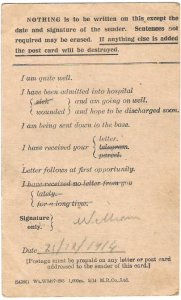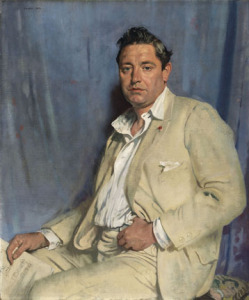Envelope addressed to Miss Crawshaw, 29 etc – franked 4 De 14 – again with No Stamps Available on the top – were they expected to pay postage
Letter dated 3-12-14
Dear Till
At last I have got time to answer your letter which I received in the trench. I have heard from everyone this last week and it’s the way when you can’t find time to answer them. Now Till, don’t send out the socks, for have just had some sent to me from those people in Belfast who’s wedding I went to, he is missing Till, they have not heard from him yet. Yes, I would sooner have the underclothing than the Jersey, I am proper hitchy coo you can’t help it Till. We are still in the trenches and what with the rain we are up to our eyes in mud it’s enough to feed (?) you up.
Till I haven’t been feeling myself lately what with the shells bursting just in front of our trench and the wet and cold I feel as if I could do with a rest for me nerves are all shattered, we get relieved from the trenches tomorrow night and then we go back for five days rest which we have all earned.
I had a letter from Tom and have sent him a PC for the time being he said that he is getting on alright and that he hopes I get back safe and he hopes to be round at the Hope and Anchor before long trying the cold tea. Yes we heard about L Roberts the day after he died. I expect it was a fine sight to see, so you blacked your nose and saw the funeral.
Jess has been ill but is getting on alright now have you heard from her lately I had two letters. Tell Aunt Mrs Coats old man is still with us, yes I would sooner be filling her scuttle and out here only a dream. We are still on the go and doing our bit to polish the Germans off, what does Albert think of it. Have not heard or seen them chocolates yet, had a letter from Bert and have answered it said that he stopped the blue bag. I told him that was only half his luck, better than stopping a Jack Johnson.
Till I dropped a PC to St Anne Road but have not heard from them yet. Pleased to hear that you are getting on alright and still mucking in. How is all at home still merry and bright I hope and still mucking in. Remember me to all and tell Aunt I will answer her letter soon, this time last year Till I was saying only another 20 days to Furlough what a difference this, never mind lets hope for better days in store and I trust it will be soon.
Now Till I must conclude hoping this letter finds you in the best of health and hope to hear from you soon remember me to all at home and I hope Mattie is still mucking in with the cold tea. I am gasping for a Dry Ginger I mean a pint and am just going to have a lovely drop of cold?? poured (?poarred) Tat Tar with fondest love and don’t forget to write back soon.
I remain
Your loving Brother
BID
– Scribbled in at the top of the letter “I have received Tom’s letter but wrote before I got same, he is lucky to get leave I wish I had been home till him I liked the pint he said he was making some Duff am I right love to all Bid
– and also” Have you seen in the papers what Gen S Dorrien Said to us when he inspected the bat just have a look in the papers”.
3rd December 1914
The Battalion was relieved by the Norfolks and they returned to Dranoutre. The Dorsets’ diary is very light on content at the moment. According to the CWGC 5 Dorset men died today. There’s absolutely no mention of this in the diary. It’s very strange.
This letter is, as my Great Uncle Geoff writes in his notes to the transcription, “his most gloomiest”. I don’t want to dwell on that today.
Instead let’s focus on the conditions facing him and the rest of the Dorsets.
The conditions in the trenches were dire at this time. A rapid thaw along with persistent rain, had turned the land to mush. Gleichen does an excellent job of describing the situation:
O that mud! We have heard lots about Flanders mud, but the reality transcends imagination, especially in winter. Greasy, slippery, holding clay, over your toes in most places and over your ankles in all the rest—where it is not over your knees, —it is the most horrible “going” I know anywhere. Whether you are moving across plough or grass fields, or along lanes, you are perpetually skating about and slipping up on the firmer bits and held fast by the ankles in the softer ones. There is no stone in the district, nothing but rich loamy clay, alias mud. However much you dig, you never come across stone, nothing but sticky mud which clings to your shovel and refuses to be parted from it — mud that has to be scraped off at almost every stroke, mud that absorbs water like a sponge yet refuses to give it up again. Every little puddle and rut, every hoof-depression full of rain, remains like that for weeks; even when the weather is fine the water does not seem to evaporate, but remains on the surface.
And when it rains, as it did all that winter (except when it snowed), the state of the trenches is indescribable. Some were, frankly, so full of water that they had to be abandoned, and a breastwork erected behind. But a breastwork is slow work, especially if you are less than 100 yards from the enemy. For weeks, indeed, the garrison of one particular trench had to lie out on the mud, or on what waterproofs they could get, behind a shelter two to three feet high—always growing a little, yet never to be made to a real six feet height for reason of conspicuousness and consequent clusters of Black Marias.
Frank writes that he’d rather have underwear sent out to him than jumpers and socks. He explains that he is proper “hitchey coo”.
The phrase hitchey coo is a popular one from the time. It was used as a term for itchiness, perhaps coming from the name for the itchy fibre inside rose hips used by kids as itching powder. It’s also used to describe small insects and stinging nettles. It was the title of a popular ragtime song at the time and it’s the title of a song in “Oh what a lovely war“, a satirical musical based on the First World War, later turned into a film by another of my London heroes, Len Deighton. It’s also a song by the Small Faces, a very London band. It’s one of my favourite songs. I am sure Frank would have approved.

